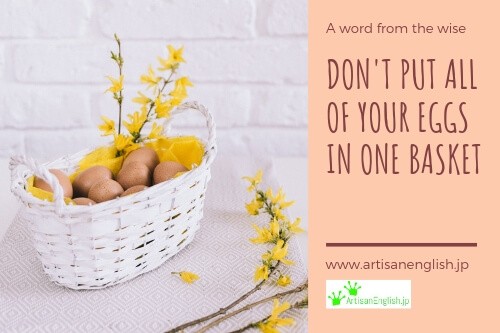
YouTube / iTunes / Spotify / Radio Public / Pocket Casts / Google Podcasts / Breaker / Overcast
Listen to ArtisanEnglish.jp posts & lesson intros here.
Proverb: Put all of your eggs in one basket
Variety is the spice of life, as they say, and it’s also a good reason not to put all of your eggs in one basket.
Imagine you’re a little girl living on a small family farm in rural Japan.
Your mother wants to make tamagoyaki for lunch, so she sends you to the chicken coop to gather eggs.
Naturally, the chickens are not too happy about the theft, but life is what it is, and you take the eggs anyway.
You put them all in a little basket, and because you’re a happy little girl, you skip back up to the house.
Unfortunately, you’re also a clumsy little girl.
As you enter the house, you trip on the doorstep.
The basket of eggs flies out of your hand, and all the eggs smash on the floor.
You broke the cardinal rule – don’t put all of your eggs in one basket, which means you should never depend on one thing for all of your success.
The safe bet would have been to use two baskets and perhaps make two trips as well.
Yes, it may be bothersome, but isn’t it better to be safe than sorry?
I don’t intend to seem mean.
It’s not the little girl’s fault.
It’s the mother’s and father’s fault for not teaching her correctly.
I bet when they invest, they never put all their money into one financial instrument.
No, not at all.
They always worry about their nest egg and are sure not to place all of their eggs in one basket.
Their assets are diversified into various stocks, bonds and maybe even a commodity or two.
The same policy should be applied to every area of our lives.
Whether we’re investing for our future or hoping to have tamagoyaki for lunch – never put all of your eggs in one basket because it’s a recipe for disaster.
Flesch-Kincaid Readability Test
This post is understandable by someone with at least a 7th-grade education (age 12).
On the Flesch-Kincaid reading-ease test, this post scores 78.
The easier a passage is to read, the higher the score on a scale of 0 – 100.

